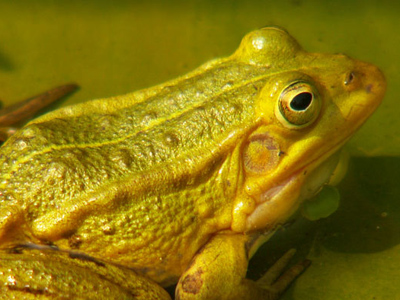
Reptiles and Amphibians - Amphibians
One trait that unites all amphibians is that they have relatively permeable skin, and they can breathe and sometimes even drink through it. This leaky skin unfortunately leads them to be especially susceptible to toxins and other environmental stressors. The name 'amphibian', which means 'two lives' in Latin, refers to their double life both in and out of the water.
The typical amphibian life cycle starts in the water with eggs that then hatch into larvae - tadpoles, in the case of frogs - which metamorphose into adult form. The adults can live relatively independently of water for extended periods of time, and in some cases, like the spadefoot toads of the southwestern United States, they can remain underground nearly an entire year without water. But even the spadefoots need to return to water to breed and complete the life cycle.
- Order: Caudata
- Family: Salamandridae
- Genus: Lissotriton
- Species: L. helveticus
- The smallest British amphibian.
- Has strongly webbed back feet that males develop during the breeding season.
- The tail has an orange central line passing along its length.
- Order: Caudata
- Family: Salamandridae
- Genus: Salamandra
- Species: S. salamandra
- Can have a very long lifespan.
- One lived for more than 50 years in a German natural history museum.
- If grabbed by a predator, they can release heavy toxic skin secretions.
- Order: Anura
- Family: Ranidae
- Genus: Rana
- Species: R. temporaria
- Are known to be able to lighten and darken their skin in order to match their surroundings.
- They have transparent horizontal pupils.
- The mating season is short, just a week in March after which the frogs move back to their terrestrial habitat.
- Order: Anura
- Family: Ranidae
- Genus: Pelophylax
- Species: P. lessonae
- In Britain, it was presumed extinct in the wild at the last remaining site by 1995.
- A single individual known from this population survived in captivity until 1999.
- An English Nature reintroduction project is underway in Breckland.
- Order: Anura
- Family: Bufonidae
- Genus: Bufo
- Species: B. bufo
- Widespread and common throughout Europe.
- They have warty skin, usually green to brown.
- They mainly hunt at night and can be spotted in wet weather.
- Emit a toxic substance called bufagin in defence.
- Order: Anura
- Family: Bombinatoridae
- Genus: Bombina
- Species: B. variegata
- The eardrums are not visible.
- The overside has numerous warts with raised swirls.
- It doesn't have a vocal bladder, therefore the male's mating call is a gentle sound.
- Order: Anura
- Family: Bufonidae
- Genus: Epidalea
- Species: E. calamita
- Native to Britain, although practically confined to coastal sites.
- Has a tendency to run instead of hopping or walking.
- Natterjacks males have a very loud and distinctive mating call.
- Order: Caudata
- Family: Salamandridae
- Genus: Triturus
- Species: T. cristatus
- Native to Great Britain.
- Mating is achieved without direct contact.
- The female lays 2-3 eggs per day until 200-300 eggs have been laid! This can take up to 5 months.
- Order: Anura
- Family: Ranidae
- Genus: Pelophylax
- Species: P. lessonae × P. ridibundus
- Naturalised in Britain.
- Males have vocal sacs on the outside of their cheeks and extra skin patches on their feet, both of which are primarily for mating.
- The legs are a culinary delicacy in France.
- Order: Caudata
- Family: Salamandridae
- Genus: Lissotriton
- Species: L. vulgaris
- They have a paddle-like tail to increase the speed at which they swim.
- Also, they have a pale throat with conspicuous spots.
- When on land, their skin is velvety.
- During courtship, the male vibrates his tail in front of the female in a distinctive way.
Ready for more?
not all...
quizzers. Try to win a coveted spot on our Hall of Fame Page.

















